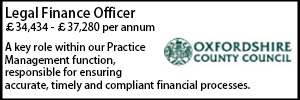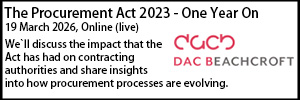Delivering 21st-century customer experience in the public sector
- Details
Rachel Buchanan examines how legal teams should support their authorities in delivering tailored services at a time of restrained resources.
Doing more for less have been the general theme for the past decade. Whether it is local authorities having to more to commercialisation to drive more revenue of public sector legal teams experiencing increasing pressure from their clients, the effects of the squeeze are clear.
As the theme of doing more with less is not likely to go away, there has never before been a more urgent need for the public sector legal teams to introduce a more strategic way of thinking - particularly around delivering up-to-date 21st-century performance and customer experience.
With technology raising the bar of expectation, it has arguably been a double-edged sword. Social media has opened a platform for increased communication, but also a customer’s ability to complain, publicly. Technology has allowed connections with stakeholders and organisations, but has also brought increased expectations of reduced costs, personalised services and more effective transactions.
Due to new developments and raised expectations there is no longer a choice as to what is effective customer service or customer experience. To keep up and thrive in this ever-progressing environment, organisations and legal teams will need consider how they will meet customer expectations and deliver an excellent customer experience.
Here are some things to consider when looking to shoot your public sector legal team into the 21st-centry of performance and customer experience:
Digital by default
Where customers and users go, organisations must follow. Customer experience and choice defines customer behaviour. Digital has transformed customer experience and turbocharged choice - meaning customer will be expecting their experience to be:
- seamless
- easy
- quick
- free
- often personalised
Digital by default is now a core strategy for public sector organisations, so by default it should be mirrored in the legal teams supporting them.
However, it can be tricky. Using the right technology is key, as without a strong understand of a department’s activities and processes, it can be easy to deploy the wrong technology.
For public sector legal teams it’s not necessarily a need to create brand new solutions. Taking advantage of the private sector investments to short circuit the traditional R&D testing and trialling that accompanies technology deployments can be key to going digital. Local authorities, and by extension their legal departments, are uniquely positioned to translate their workflows, forms and interactions using technology that has already been tested and used in the private sector.
Keep data safe
Key to providing good customer experience, both to clients and to the eventual end-user is understanding the user’s needs.
Though it may be attractive to first make services quick and easy to use, they also should be effective. This means they should also be relevant to the user via personalisation.
Personalisation, however, essentially depends on personal data.
Modern customers often expect their service providers to protect their data and data protection has to be central to every technology implemented service. It is key to good customer service and end-users rightly want to be sure that their data is safe. LexisPSL provides a GDPR toolkit to help navigate these tricky issues.
When validating new services, there are a few things legal teams should be confident on. For example, ensuring:
- the answer to “can we do this with the data?” is yes
- liabilities have been mitigated
- training is kept on top of
- legal requirements are up-to-date legal - including in relation to data protection
Manage complex requirements
As local authorities move towards commercialisation, they are having to address competition and employment regulations, as well as sensitivities on working conditions, remunerations and governance.
At the same time, the scale of the projects is growing. Whether acting as a residential landlord, commercial landlord or civil engineering investor, at every stage, local authority legal teams are expected to advise and substantially mitigate legal and operational risks.
Having a legal team that is confident it is up-to-date with the latest legal changes and the advice it is giving is authoritative and accurate, increases efficiency and reduces risk.
The ability to access information quickly means that legal teams can be confident their advice is accurate and, therefore, the decision-makers they are advising can be confident they are acting legally.
Work with the right people and invest in the right technology
As more departments come to rely on public sector legal teams and the increased complexity of public sector responsibilities drives more risk, teams are having to become more proactive and responsive. Legal teams will need to have the ability to blend strategic thinking with agile, and effective ways of identifying and solving problems.
In LexisNexis technology report: Legal Technology: Looking past the Hype, which investigated how legal departments are using and benefitting from legal tech, it was found that two in three lawyers lack the time to fully understand the legal tech market.
For legal teams, it is vital to have a firm grasp on what they are trying to achieve and what the current failings, problems and gaps are, before they make technological investments. This avoids deploying and investing in technology that is not fit for purpose or unable to achieve the desired solution.
As Paul Cummins, then Head of Legal and Deputy Monitoring Officer from Milton Keynes Council, said in a recent LexisNexis interview: “there needs to be a dialogue between legal and those who understand the technology, working together to find the best solution before implementation as time and money spent on the wrong solution is counterproductive and adds no value.”
Be prepared to be agile
“We have to become more agile as our clients’ expectations and requirements change. The only thing we know is that tomorrow is going to be different and we must be prepared,” observed Robert Baldwin, former Lead lawyer in Legal Services at Wolverhampton City Council Legal Services.
Legal teams expecting and embracing change will more easily deliver better customer experience to clients and end-users. Being confident teams can provide what is needed and keep down the cost allows teams to be more profitable and leads to more effective commercialisation.
To view the latest version of this document and thousands of others like it, sign-in to LexisPSL or register for a free trial by clicking on the banner below.
Child Care Lawyer
Legal Director - Government and Public Sector
Locum roles
 Safeguarding Issues and Fairness in Investigations and Hearings - 3PB
Safeguarding Issues and Fairness in Investigations and Hearings - 3PB
24-02-2026 11:00 am
Online (live)
 Children and Young People (DoL, Competency and Capacity) - Peter Edwards Law Training
Children and Young People (DoL, Competency and Capacity) - Peter Edwards Law Training
25-02-2026
Online (live)
 One Project or Two? EIA Rules for Renewable Schemes and Grid Connections - Cornerstone Barristers
One Project or Two? EIA Rules for Renewable Schemes and Grid Connections - Cornerstone Barristers
26-02-2026
Online (live)
 Court of Protection Property and Financial Affairs Webinar Series: Contested Statutory Will Application - 39 Essex Chambers
Court of Protection Property and Financial Affairs Webinar Series: Contested Statutory Will Application - 39 Essex Chambers
02-03-2026
Online (live)
 Housing and Homelessness Conference - Birmingham 2026 - 4-5 Gray's Inn Square
Housing and Homelessness Conference - Birmingham 2026 - 4-5 Gray's Inn Square
03-03-2026 9:30 am
East Midlands
 Law Enforcement Data Processing and Part 3 of the DPA 2018 - Act Now
Law Enforcement Data Processing and Part 3 of the DPA 2018 - Act Now
05-03-2026 10:00 am
Online (live)
 Cross-Border Placements of Children - Justin Gray, Trinity Chambers
Cross-Border Placements of Children - Justin Gray, Trinity Chambers
05-03-2026 3:00 pm
Online (live)
 The Case for Ecocide Law: In Conversation with Gerard Forlin KC and Jojo Mehta - Cornerstone Barristers
The Case for Ecocide Law: In Conversation with Gerard Forlin KC and Jojo Mehta - Cornerstone Barristers
05-03-2026 5:00 pm
London
 Grappling with S73 - variations of conditions applications or appeals - Ivy Legal
Grappling with S73 - variations of conditions applications or appeals - Ivy Legal
09-03-2026
Online (live)
























































































































 Planning Law Update Wales for Local Authorities and Other Government - FTB
Planning Law Update Wales for Local Authorities and Other Government - FTB  The Procurement Act - One Year On - DWF
The Procurement Act - One Year On - DWF  The ERA – An Overview - Sharpe Pritchard
The ERA – An Overview - Sharpe Pritchard  Certified Information Privacy Manager (CIPM) - The Training Centre
Certified Information Privacy Manager (CIPM) - The Training Centre  Roundtable Event: Risks arising from Inquests and Legal Update - Devonshires
Roundtable Event: Risks arising from Inquests and Legal Update - Devonshires  The General Data Protection Regulation - Act Now
The General Data Protection Regulation - Act Now  Data protection Conference - Hugh James
Data protection Conference - Hugh James 